Did I lose my Self to Christian Freedom?
Consciousness and Neuroscience in a Physical World
Can freedom from the self and freedom for loving the neighbor be accomplished by self-determination?
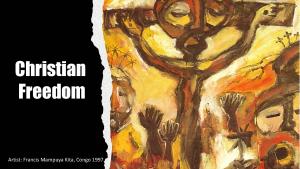
Toward the end of the preceding post, I confessed to dunking the theologian in hot water. How can the theologian explain selfless caring for the neighbor as an act determined by the self? On the one hand, I defended the independent and agential self with libertarian free will against neuro-centrist philosophers who would drown the self in a flood of neuro-circuitry. Now, on the other hand, the concept of Christian freedom posits that you and I have the capacity to surrender the self. To enslave the self even! To give up self-orientation in the service of loving the neighbor. Are these compatible?
“To be free, you need self-control,” writes Jay Kim for the Gospel Coalition. What might that mean? It means you gain positive freedom by gaining self-direction rather than being pushed around by other-direction. Yet, the loving and caring Christian wants to place the self at the disposal of the neighbor who has needs to be met. Are these reconcilable?[1]
Perhaps it goes without saying that Christian freedom has nothing to do with religious freedom. The latter, religious freedom, is a form of liberty that permits each individual to choose to adhere to one or another form of religious or non-religious belief or practice. Christian freedom and freedom of religion belong to two separate conceptual domains. They rarely overlap.
In this post, we will wrestle with the paradoxes within distinctively Christian freedom, especially the combination of freedom from the self combined with freedom for loving the neighbor.
Protecting the Self from Neuro-Deterministic Thieves
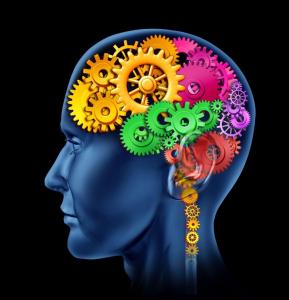
In this larger Patheos series on the implications of neuroscience and neurophilosophy for theological anthropology, I have argued forcefully for the existence of a human self. The presence of a human self is necessary to understand human free will as self-determination. The self is an agent that deliberates, decides, and takes action. We experience self-determination many times per day. So, over against the brain-mind identity theorists, I have defended the presence of your self and my self on phenomenological grounds.[2] It is simply phenomenologically ostensive that you and I as a conscious self are the subject of experience. And free will is a part of that experience. There is no experience without a self to experience it. The self is hardcore. The self is inexpungable from human experience. The self must exist because it’s presupposed in all analyses of this subject matter. Slam dunk, eh!
A self which sacrifices itself? Nonsense? Or, Reality?

Well, our work is not yet done. When we turn to public systematic theology, we need to explicate the notion of self-sacrificial love within Christian freedom. Freedom from the self and for the neighbor: Does this mean the removal of the self? Huh? Here I’ve done everything to support a robustly centered selfhood, and now I have to give it up? How does that work?
Here is the path we will follow. Step one will be to remind ourselves briefly of four different understandings of freedom. Christian freedom differs from psychological or political understandings and even philosophical understandings of freedom. Our second step will be to explicate what Saint Paul and Martin Luther mean by distinctively Christian freedom, a freedom from the self on behalf of loving the neighbor for the sake of the neighbor’s flourishing.[3]
Four Freedoms
Christian freedom is distinct from common understandings of freedom. Where does Christian freedom fit with other kinds of freedom?
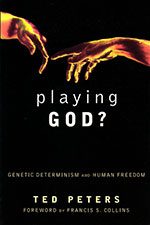
In addition to free will we need to account for political liberty, Christian freedom, and future freedom. These four make up the list that appears in the book, Playing God? Genetic Determinism and Human Freedom. (Peters, Playing God? pp. 17-20)
- Political freedom or liberty
- Free will or libertarian freedom
- Christian freedom, moral freedom, or virtue
- Future freedom
Political freedom or liberty is one form of freedom from. Some call it negative freedom, because with liberty you and I are exempt from excessive coercion. This kind of freedom enjoys daily living without the government telling us what to do or the political party telling us what to think. In essence, political freedom or liberty removes external coercions.
What we know as religious freedom is just one form of political freedom or liberty. “Religious freedom is a shield provided by the constitution that protects our right to practice our faith free of persecution,” observes Patheos columnist Jen Butler. She’s right. Again, do not confuse religious freedom with Christian freedom.[4]
Free will or libertarian freedom, is positive freedom. It’s freedom to. Free will or libertarian freedom refers to self-determination. The human self is an agent who deliberates, decides, and takes action. That’s the essence of free will or libertarian freedom. This is what I have been protecting against the neurocentric thieves who want to steal our free will and fence it to the brain.
Future freedom, the fourth in our list, is the opportunity we have to influence the course of future events. We may decide to build a house and take the action to build it. When we die, that house continues on to provide a home for a family. Our free decision and action had an impact–even if modest–on the course of physical history.
What about Christian freedom? In light of the Pauline-Augustinian-Reformation tradition, Christians operate with human freedom on two levels. At the first level, we daily enjoy free will in the form of libertarian freedom. We all enjoy the ability to make choices. We all enjoy deciding whether to be vegetarian or meat eating. We all enjoy being a tad unpredictable. We all enjoy choosing between Republicans and Democrats. Well, maybe that’s going too far.
When it comes to our relationship with God, however, we move to a higher level. Our self is unable on its own power to choose God. Our will is bound. Our will is bound to choose what the self already wants. Christian freedom, then, requires liberation of the self from itself by the power of divine grace. We’ve come to know Christian freedom as freedom from the self and freedom for the neighbor.
To these two forms of freedom—libertarian freedom and Christian freedom—we now turn in more detail. Here we will continue a discussion begun in, “The Danger of Free Will Denial.”
Christian Freedom According to the Public Systematic Theologian
For freedom Christ has set us free. Stand firm, therefore, and do not submit again to a yoke of slavery. (Galatians 5:1)
“This sentence [Galatians 5:1], says Patheos columnist Owen Strachan, “unlocks the prison door of the heart. As believers, we are fundamentally free. We are in Christ, and he is freedom itself.” In his Cranach blog, Gene Veith adds:
“Freedom gives us the most exhilarating applications of the Gospel, including Luther’s teachings on how Christians are simultaneously saints and sinners, that we are simultaneously free lords of all and servants of all, that the Christian life involves loving and serving our neighbors, that we are to be “little Christs” to each other,”
Christian freedom includes freedom from the self and freedom for loving the neighbor.
As you can see, once the systematic theologian turned public theologian enters the fray, the battle takes a different turn. After defending the citadel of selfhood from reductionist bombardment, the public theologian breaks down the protective walls and delivers the self to both neighbor and enemy in selfless love. Rather than protect the self, the theologian tries to give the self away. And to make matters more confusing, the theologian’s trumpet rallies us to liberate the self from itself.
Freedom simply does not mean the same thing for both the philosopher and the theologian. Here in this brief column post, I’d like to augment the previous defense of human freedom with a concise answer to the question: just what is distinctively Christian freedom?
Level 1: Self-Determination
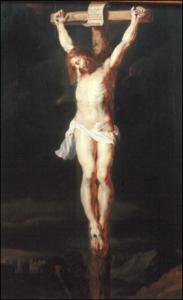
The model of daily freedom as self-determination is by no means foreign to the theologian. Even Karl Barth can acknowledge: “A free man is one who chooses, decides, and determines himself and who acts according to his thoughts, words, and deeds” (Barth, 1968, p. 84). Or, in the words of John Cobb, “Self -determination…must mean that the intention was not in its turn a product of antecedent factors alone. Instead the intention must have been in part self-determined in the moment in which it precipitated the action” (Cobb, 1983, p. 52). Natural freedom buttressed by political liberty betoken human beings who exhibit future freedom: we can make history through deliberation, decision, and activity.
But, the theologian senses a Quisling within the free will fortress. According to the Augustinian tradition, the natural self is incurvatus in se, curved in upon itself. The self cannot but express itself on behalf of its own self-interest. What in our democratic culture is celebrated as free will is nothing more than subjective arbitrariness, the unavoidable choosing of what would be in a person’s own self-interest.
This theological threat posed by the human will surfaces in America’s great Reformed theologian, Jonathan Edwards. Speaking for Edwards, Patheos columnist Coyle Neal tells us that the will is the part of a person by which our inmost desires and inclinations are transformed into real-world action. When we perform an act of the will, we are exercising that aspect of the human being which works as a conduit between who we are internally and what we say and do externally. In a sense, the will is a tool of the mind that converts our “wants” into “actions.”
Our daily freedom, to put it another way, is bound to self-interest. The will is a slave of the self.
What happens, then, when we are called to a high moral standard in which the interest of the other is required? Can the self sacrifice the self? Can the self be liberated from itself? Theologians in the Augustinian tradition answer: yes, when the self is empowered by the Holy Spirit. In Augustine the terms ‘grace’ and ‘Holy Spirit’ and interchangeable on this topic. When we are graced by God, we are free for loving the neighbor.
Level 2: Christian Freedom from Self & Freedom for Others
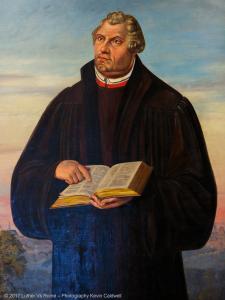
Enter: Christian freedom. In the face of this bound will, what Christians intend by the mandate to love God and to love neighbor requires liberation from this bondage to the self. Martin Luther presents the challenge in the form of a stark paradox:
The Christian individual is a completely free lord of all, subject to none.
The Christian individual is a completely dutiful servant of all, subject to all in love.
(Luther, The Freedom of a Christian, 2015-2020, p. 488)
Voluntary enslavement? Really? Yes, according to Luther. And to one Luther interpreter, Porter Case Taylor.
“The point of Christian freedom is that we can now choose to subject ourselves to others, to serve others, to be dutiful to others. And as such we willingly subject ourselves to the Law of Christ—or the Law of Love—in that we aim to live as Christ lived, to love as he loved, to treat others as he did, and to work for the salvation of all people.”
God’s grace liberates the self from the self in order for the self to love another self as itself. By no means is Christian freedom a variant on the Buddhist notion of anatta, no-self. Quite the opposite. For the Christian, it’s a transformed self not an absent self.
Empowered by divine grace the human self becomes a more robust self, but a de-centered and loving self. “Love begets love,” Luther interpreter Carmelo Santos reminds us. God’s love in the form of grace begets our love in the form of service to the neighbor.
Theololgian Paul Hinlicky employs the term, decentering, to make the point regarding true freedom. “So true freedom on the earth consists in such decentering freedom from self for others and all in love and hope,” writes Hinlicky; “freedom in faith from all other claims of allegiance, and just so the Spirit’s martyrs refusing to bend the knee to the bullies or to sell one’s the soul to their sycophants. Decentering is to dwell in Christ by faith that works in love and hope” (Hinlicky, 2010, p. 170).
Theologian Karl Barth called this, “evangelical ethics.” Despite what sociologists say about Protestantism and capitalism, both our Lutheran and Calvinist colleagues claim that Christian freedom frees the self for pursuing justice on behalf of others.
Cal Tech neuroscientist and neurotheologian Michael Spezio adds flesh to the skeleton of neighbor-love. To love requires humility understood as kenotic empathy. “Humility as the practice of kenotic empathy empties me of my assumptions of the other and clears space for me to welcome them, to see them, to hear them, so that I can begin to understand.”
Decentering. Kenotic loving. Within the framework of Christian freedom, love in the form of agape love describes a human person in the act of loving either God or neighbor in such a way that his or her self is transcended.
Christian freedom and the flourishing of the neighbor

Christian freedom is a seed that blossoms in public theology. At least according to the Lutheran World Federation. “Public engagement is the church’s ongoing response to the freedom we receive in Christ to love and serve our neighbor in need.” Now how did we get from Christian freedom to public engagement? Via the path of agape love.
In agape love, we become free from our self to love God and neighbor. What does this imply? Does it imply that a society of free Christians would be a society with no selves? No way. Why?
Let’s try a thought experiment. What does it mean to love our neighbor selflessly? It means that we treat the neighbor with dignity. It means we treat the neighbor as a moral end and not merely a means to further end. What is our neighbor’s end? It’s human flourishing. According to Jonathan Pennington’s “A Biblical Theology of Human Flourishing,”
“…human flourishing must be rediscovered as a central part of the Bible’s teaching on salvation and redemption. God is not unconcerned about our well-being and happiness; peace, happiness, blessedness, health, joy, and abundance of life are the consistent message of Scripture and the goal of God’s work….If God’s goal in redemption is the restoration of our full humanity and our God-centered human flourishing, then there is no doubt that the mission of the Church—God’s people on earth—should be the same. Our theological reflections and their practical outworking must be to bring true human flourishing to individuals and society as a whole.”
This implies that when you and I love our neighbor for the sake of the neighbor’s flourishing, we support and enhance that neighbor’s self-determination. Our selfless care enhances our neighbor’s self-actualization, self-realization. The self is a good thing. The self is what flourishes in God’s kingdom.
The Christian Freedom Paradox: self-expression as selfless-expression
What does this imply for the scientific and philosophical debate? Self-determination does not go away. Even in the case of Christian freedom, we can observe that it is still the human self which deliberates, decides, and acts. Even the liberated person with the decentered self committed to neighbor love still takes action produced by a self that deliberates and decides. Decentered moral action still results from deliberation and decision centered in the self.
From the perspective of the everyday world at the first level, the person liberated by divine grace looks like a rugged individualist: mission-bent, self-creative, independent, and courageous. Eastern Orthodox theologian, the late Nonna Verna Harrison ,avers, “Divine freedom supports human freedom, and human freedom is called to cooperate with divine freedom….Human freedom is a good gift because it makes it possible for us to love God in return, to assist in God’s work, to grow into the divine likeness” (Harrison, 2008, p. 82).
Here is the paradoxical point: loving one’s neighbor or loving God for God’s sake cannot avoid taking the form of self-expression. This obtains even when engaged in moral self-denial in the interests of the beloved. This paradox is unavoidable. We must accept the reality that in this life our loving actions will inevitably include self-expression and self-determination even when oriented toward a good which transcends the self. Pure selfless action is impossible. Yet, loving one’s neighbor and loving God is possible.
This led Luther to a new commandment: sin boldly! “Be a sinner and sin boldly, but believe and rejoice in Christ even more boldly, for he is victorious over sin, death, and the world” (Luther, Letter to Philip Melanchthon (August 1, 1521), 1961-1986, pp. 48:281-282). (World Heart by Madi, Bali)

Libertarian Freedom & Christian Freedom
We need not think of all laboratory researchers as soldiers in an army marching against free will. What we learn from Karim Fifel in the Journal of Neuroscience, for example, is that the science requires neither determinism nor elimination of libertarian free will. “Neuroscience may in no way interfere with our first-person experience of the will, it can in the end only describe it … it leaves everything as it is.” The free will deniers march with the neuro-centrist philosophers, not the actual scientists. Regardless, the assault requires a defense.
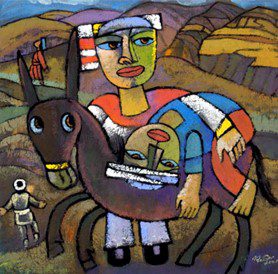
In the war to protect libertarian freedom from the forces of free will denial, I have found protection by formulating a precise definition. Libertarian freedom should be understood as the human self as agent when engaged in deliberation, decision, and action. This definition does not require indeterminism. Rather, it is compatible with three-part determinism: nature, nurture, and self. I have defended this model of human freedom over against neurocentrist free will deniers who try to reduce what we experience as free will to two-part determinism, nature and nurture.
For the theologian in the Pauline and Augustinian and Reformation tradition, however, this leaves the job only half done. Libertarian freedom needs to be supplemented by Christian freedom–that is, freedom from the self and freedom for the neighbor. Are these two levels of freedom in tension? Yes and no.
Conclusion
On the surface, the doctrine of Christian freedom appears to sacrifice the very self earlier defended when morally prescribing selfless love toward the neighbor. It appears that the very self I had defended philosophically and scientifically must now be given away theologically.
The tension is resolved, however, when we realize the paradox. What actually happens is that the human self empowered by divine grace becomes capable of self-transcendence. This is a moral self-transcendence, a giving of the self over to a principle of virtue or to the well-being of a neighbor in need. Such selfless loving requires self-generated initiative, creativity, and courage. Paradoxically, the giving of the self defines the self as a giving self. This makes the self godly.
▓
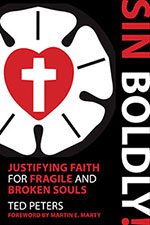
Ted Peters pursues Public Theology at the intersection of science, religion, ethics, and public policy. Peters is an emeritus professor at the Graduate Theological Union, where he co-edits the journal, Theology and Science, on behalf of the Center for Theology and the Natural Sciences, in Berkeley, California, USA. His book, God in Cosmic History, traces the rise of the Axial religions 2500 years ago. He previously authored Playing God? Genetic Determinism and Human Freedom? (Routledge, 2nd ed., 2002) as well as Science, Theology, and Ethics (Ashgate 2003). He is editor of AI and IA: Utopia or Extinction? (ATF 2019). Along with Arvin Gouw and Brian Patrick Green, he co-edited the new book, Religious Transhumanism and Its Critics hot off the press (Roman and Littlefield/Lexington, 2022). Soon he will publish The Voice of Public Theology (ATF 2023). See his website: TedsTimelyTake.com. His fictional spy thriller, Cyrus Twelve, follows the twists and turns of a transhumanist plot.
▓
Notes
[1] Sean McDowell tries to formulate the problem we address here.According to the Christian worldview, true freedom is not a matter of doing what you want without restraint, but cultivating the right wants and living in obedience to God’s will. In other words, freedom results when our wants align with God’s will.
Does that mean freedom comes through self-determination? No! If you try to be obedient through your own effort you will fail. In fact, if you try to follow God’s commands in your own power, you will probably fail miserably.
[2] In the tradition of Isaiah Berlin, citizens have negative freedom as well as positive freedom. Negative freedom is freedom from coercion by other people. Positive freedom is freedom to pursue intentions. Intentional action is evidence of self as agent. Can mind-brain identity theory support this? “The intentional action is thus free from the external constraints represented by the stimulus and the movements to which it leads. In that sense, cognitive neuroscience has to date aligned mostly with freedom from. A positive account of intentional action, based on freedom to, remains underspecified in the current cognitive neuroscience literature.” Source: Sophia Bonicalzi and Patrick Haggard, Frontiers.[3] Here are the posts in the present series on the implications of neuroscience and neurophilosophy for Christian anthropology.
Did I lose my Conscious Mind to Science?
Did I lose my Free Will to Science?
Did I lose my inborn sense of God to Atheism?
Did I lose my Self to my Brain?
Did I lose my Self to Determinism?
Did I lose my Self to Christian Freedom?
[4] Theologian Caryn Riswold observes, “progressive people of faith are dispelling the idea that religion is monolithic, and working to protect the right of people of all faiths and no faith to exercise their conscience.” This is political liberty applied to religion.Bibliography
Barth, K. (1968). The Humanity of God. Louisville KY: Westminster John Knox.
Cobb, J. (1983). God and the Scientific Worldview. In e. David Tracy and John Cobb, Talking about God: Doing Theology in the Context of Modern Pluralism. New York: Seabury.
Dennett, D. (2006). Breakikng the Spell. New York: Viking.
Gazzaniga, M. (2011). Who’s in Charge? Free Will and the Science of the Brain. New York: Harper.
Harrison, V. (2008). The human person as an image and likeness of God. In M. C. Theokritoff, The Cambridge Companion to Orthodox Christian Theology (pp. 78-92). Cambridge: Cambridge University Press.
Hinlicky, P. (2010). Luther and the Beloved Community: A Path for Christian Theology after Christendom. Grand Rapids MI: Wm B Eerdmans.
Kane, R. (2005). A Contemporary Introduction to Free Will. Oxford: Oxford University Press.
Krapiec, M. (1985). I-Man: An Outline of Philosophical Anthropology. New Britain CT: Mariel Publications.
Lakoff, G. (2006). Whose Freedom? The Battle Over America’s Most Important Idea. New York: Farrar, Straus, and Giroux.
Luther, M. (1961-1986). Letter to Philip Melanchthon (August 1, 1521). In M. Luther, Luther’s Works, American Edition, 55 Volumes (pp. 48:281-282). Minneapolis MN:: Fortress Press.
Luther, M. (1969). The Bondage of the Will. Louisville KY: Westminster John Knox.
Luther, M. (2015-2020). The Freedom of a Christian. In M. Luther, The Annotated Luther, 5 Volumes (pp. 1: 467-518). Minneapolis MN: Fortress Press.
Metzinger, T. (2003). Being No One. Cambridge MA: MIT Press.
Peters, T. (2002). Playing God? Genetic Determinism and Human Freedom, 2nd ed. London and New York: Routledge.
Peters, T. (2018). Contingency and Freedom in Brains and Selves. In e. Robert John Russell and Joshua Moritz, God’s Providence and Randomness in Nature (pp. 261-288). West Conshocken PA: Templeton Press.














